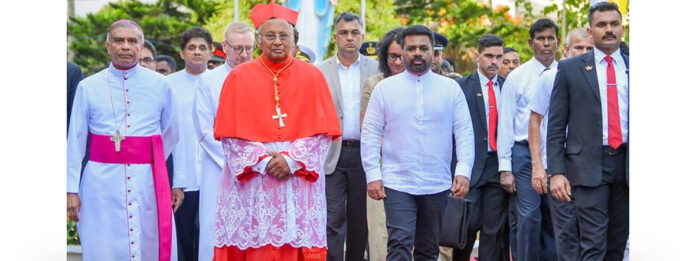As Cardinal Malcolm Ranjith marks 50 years of priesthood, it is an opportune moment to reflect on his significant contributions to Sri Lanka’s Catholic community. A respected and often outspoken figure, his journey has been marked by unwavering faith, social activism, and leadership through times of national crisis. Yet, amid growing controversy and criticism, questions are emerging about whether the time has come for him to step aside and make way for a new generation of leadership—one that can unify and guide the Church through an increasingly complex landscape.
Political Connections
Cardinal Ranjith has long been admired for his moral courage, particularly in advocating for the marginalized and confronting injustice. His voice during Sri Lanka’s post-civil war years earned widespread respect. However, in recent times, his interventions have often intersected with political narratives, raising concerns about the perceived politicization of the Church. A particularly troubling development was the recent revelation by Minister Bimal Ratnayake that certain police appointments were made at the Cardinal’s request—an allegation that has intensified public scrutiny and sparked debate about the role of religious leaders in state affairs.
Easter Sunday Attacks
His forceful criticism of the government’s handling of the 2019 Easter Sunday attacks is another flashpoint. While the pursuit of justice is both legitimate and necessary, the tone and trajectory of his campaign have, to some, appeared overly politicized. This has led to concerns that such activism risks deepening societal divisions, aligning the Church with particular political interests rather than maintaining its spiritual and moral independence. When religious leadership becomes entangled with partisan agendas, it can erode the institution’s credibility and alienate parts of the faithful.
Allegations
Moreover, internal disputes and accusations of mismanagement within the Church have further clouded his legacy. Detractors argue that his leadership has, at times, discouraged open dialogue and bred division within the Catholic community. In a nation as ethnically and religiously diverse as Sri Lanka, perceptions of alignment with specific political or ethnic factions can be particularly damaging, hindering efforts toward reconciliation and unity—principles that should lie at the heart of any spiritual mission. Given these realities, Cardinal Ranjith stepping down after five decades of service could be a wise and dignified move. It would not only allow the Church to renew itself under fresh leadership but also send a powerful message of humility and self-awareness. By exiting the public stage gracefully, he would reinforce the Church’s commitment to spiritual integrity over political entanglement, and help restore trust among a broader cross-section of the faithful. In conclusion, while Cardinal Malcolm Ranjith’s impact on the Church and society is unquestionable, the current climate calls for reflection and renewal. A graceful retirement would safeguard his legacy and allow the Catholic Church in Sri Lanka to realign with its core mission—offering faith, hope, and healing to all.
Adolf D.
